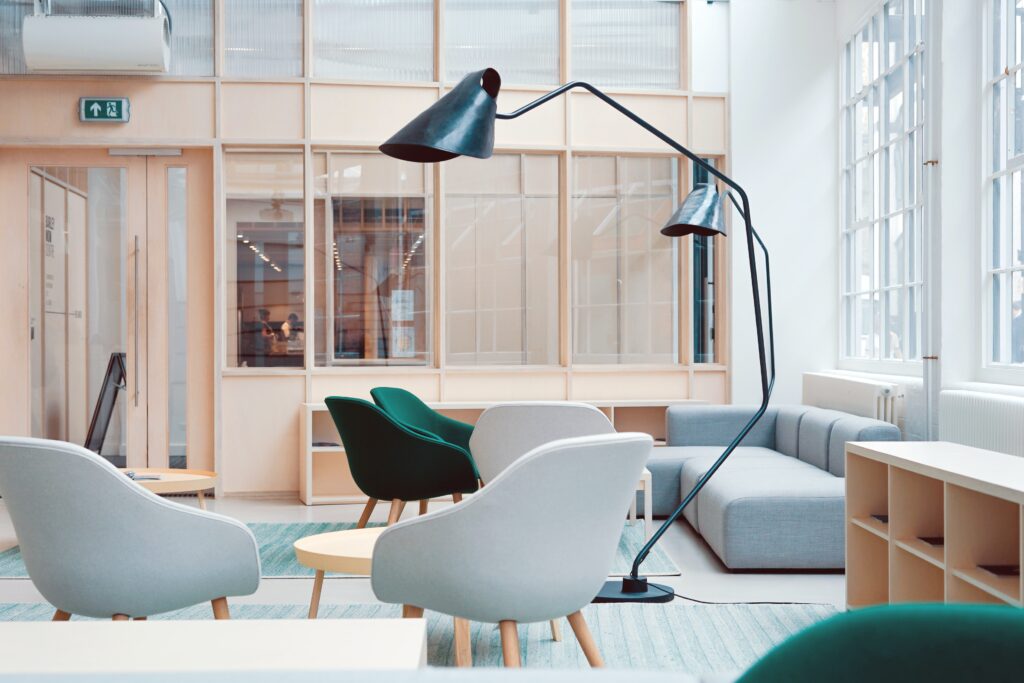As a small business owner in the Greater Toronto Area, choosing the right office furniture is crucial for productivity and employee satisfaction. But with so many options available, it can be overwhelming. In this article, we’ll provide the ultimate guide to purchasing office furniture for small businesses, covering everything from budgeting to vendor evaluation.

Table of Contents
Benefits of Quality Office Furniture
Investing in quality office furniture has numerous benefits for your business. Here are some of the top benefits:
Increased Productivity
Well-designed and comfortable office furniture can help boost employee productivity. Ergonomic chairs and desks can reduce physical discomfort, such as back and neck pain, which can distract employees from their work.
Improved Health and Well-being
Quality office furniture can also contribute to employee health and well-being. Poorly designed furniture can cause musculoskeletal disorders and lead to absenteeism. Ergonomic chairs, adjustable desks, and proper lighting can improve employee health and prevent work-related injuries.
Positive Office Aesthetics
The right office furniture can contribute to a positive office atmosphere and create a professional appearance for clients and visitors. A well-designed and cohesive office space can also improve employee morale and job satisfaction.
Long-term Cost Savings
Investing in quality office furniture may seem like a higher upfront cost, but it can lead to long-term cost savings. Durable and high-quality furniture can last for years and reduce the need for frequent replacements, repairs, and maintenance.
The next section will cover how to budget your office furniture purchase.
Budgeting for Office Furniture
Before making any purchases, it’s important to determine your budget for office furniture. This will help you prioritize your needs and make more informed decisions about which pieces to buy.
Assess Your Needs
Start by making a list of the furniture pieces you need and the quantity required for each. Consider the size of your office space, the number of employees, and the type of work being done.
Determine Your Budget
Once you have a clear idea of your needs, you can determine your budget. Keep in mind that office furniture is an investment, and it’s worth spending more for quality pieces that will last longer.
Consider Financing Options
If you don’t have the funds to pay for all your furniture upfront, consider financing options. Many vendors offer payment plans or leasing options that can help you spread the cost over time.
Factor in Additional Costs
Remember to factor in additional costs beyond the price of the furniture itself. This includes shipping, assembly, and any necessary installation services.
By setting a budget and prioritizing your needs, you can make more informed decisions about your office furniture purchases and ensure that you’re getting the most value for your investment.
Types of Office Furniture
When it comes to purchasing office furniture, there are several types of furniture to consider. Below are some of the most common types of office furniture:
Desks
Desks are essential pieces of furniture in any office. They come in different sizes, shapes, and materials. Some of the common desk materials include wood, metal, and glass. Desks can be standalone or come with additional features like drawers, cabinets, or shelves.
Chairs
Chairs are another crucial office furniture item. They come in different styles, materials, and designs. Some of the common types of chairs include task chairs, executive chairs, and conference chairs. It’s essential to choose chairs that are ergonomic and provide adequate support for employees’ backs.
Storage units
Storage units are essential for keeping the office organized and clutter-free. Some of the common types of storage units include filing cabinets, bookcases, and shelves. When selecting storage units, it’s crucial to consider the amount of space needed and the type of materials that will be stored.
Conference tables
Conference tables are essential for meetings and group discussions. They come in different sizes, shapes, and materials. Some conference tables come with built-in power outlets and other features like cable management systems.
Reception furniture
Reception furniture is the first impression visitors have of your office. It includes chairs, tables, and sofas. Reception furniture should be comfortable and inviting to make visitors feel welcome.
When selecting office furniture, it’s essential to consider the type of work that will be done in the space and the number of employees who will be using it. Choosing the right furniture can improve employee productivity, well-being, and satisfaction.
Selecting the Right Office Furniture
Once you have determined your budget and the type of furniture you need, it’s time to select the right pieces for your office. Here are some factors to consider when making your selection:
Durability
Opt for high-quality materials and sturdy construction to ensure longevity. A durable piece of furniture will save you money in the long run by avoiding the need for frequent replacements.
Brand reputation
Look for reputable brands that offer warranties and reliable customer service. Check reviews and ratings online to get a better idea of the quality and customer satisfaction levels.
Functionality
Consider the functions of each piece of furniture and how it will be used. For example, if you need storage, look for desks and cabinets with ample storage space.
Comfort
Look for chairs and desks that provide adequate back support and are adjustable to accommodate different body types.
Style
Choose furniture that complements the overall aesthetic of your office. Consider factors such as color, texture, and design.
Selecting Office Furniture Vendors
When it comes to selecting office furniture vendors, it’s essential to do your research to find the best fit for your business. While there are plenty of vendors in the Greater Toronto Area, not all are created equal. Here are some key factors to consider when evaluating and comparing vendors:
Quality of Products
Look for vendors who offer high-quality products that are durable and built to last. Consider the materials used, the warranty offered, and the overall reputation of the vendor.
Customer Service
The right vendor should have excellent customer service, which includes timely responses to questions and concerns, flexible delivery options, and helpful support throughout the purchasing process.
Pricing
While it’s essential to stay within budget, don’t let price be the only factor in your decision. Look for vendors who offer competitive pricing for their products and services without sacrificing quality.
Experience
Look for vendors who have experience working with small businesses in the Greater Toronto Area. A vendor who has successfully completed office furniture installations for businesses similar to yours will be better equipped to understand your specific needs.
Sustainability
Consider vendors who offer eco-friendly or sustainable options, especially if sustainability is an important value for your business.

